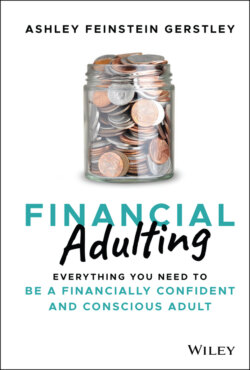Читать книгу Financial Adulting - Ashley Feinstein Gerstley - Страница 25
The Idea That You Can Pull Yourself Up by Your Bootstraps Is a Scam
ОглавлениеBlack people are paid less, the things they own are worth less, but then you tell me to pull myself up by my bootstraps.
—Tiffany Aliche, The Budgetnista
Oof. This quote stuck with me during our interview. Tiffany Aliche (a.k.a. The Budgetnista) is a financial educator, bestselling author of Get Good With Money, and a Black woman. You'll be hearing a lot more from her (you're welcome). I was very intentional about featuring different voices, ethnicities, economic backgrounds, perspectives, and expertise throughout this book. Know that these are people I respect immensely. These are people I was giddy to interview. These are people I consider my financial adulting leaders and friends. You can find a list of where to follow and connect with each of them in the Financial Adulting toolkit (financialadultingbook.com).
Okay, back to scams. I repeat, telling people to pull themselves up by their bootstraps is a scam.
Financial education is important and we'll get into why and what that needs to look like, but until we see real significant changes from the top – I'm talking changes in government and corporate policy – financial literacy can't and won't solve our problems.
Mehrsa Baradaran, author of The Color of Money and professor at UC Irvine, shares, “I wrote my book to debunk the myth that you can leave the systems of credit, banking, and federal policy intact and you alone or your community can accumulate wealth, work hard, save your money, and close the wealth gap. Of course it works in individual cases but we take these individual cases and exceptions and make rules of them.”
In our interview, Dasha Kennedy, financial activist and founder of The Broke Black Girl, shared about the link between politics and personal finance:
When people say leave politics out of money, there's no way to do that. When how I pay taxes is decided through policy, how much I'm going to pay in childcare is decided through policy, how my kids’ schools are funded is decided through policy, and how much I'm going to be paid is decided through policy, we can't leave that out. And to even think that that's possible comes from a place of privilege. If you have an overflow of money and access to capital, policy probably really doesn't matter to you because you have your saving grace. But for me, I have to care about those things because it impacts my money.
That's why when people say they educate about personal finance but “stay out of politics,” it's complete BS.* Policy is critical and completely intertwined with our financial lives.
Financial adults understand the smart money moves they can make, but they also understand and advocate for the changes that need to be made at the top.
I am a white, upper-middle-class, cisgender, heterosexual, nondisabled woman. And as a financial adult, I'm going to use that privilege to bring all other women up with me. I can't call myself a feminist or anti-racist if I don't believe and care about equality for all women.
Not to mention (and this is just icing on the cake), it's what's best for all people: our wallets, our planet, everything. As Sallie Krawcheck, the co-founder and CEO of Ellevest, says, “Nothing bad happens when women have more money.” And I bet she wouldn't disagree with me taking it a step further and saying, the world changes for the better. Much better.
